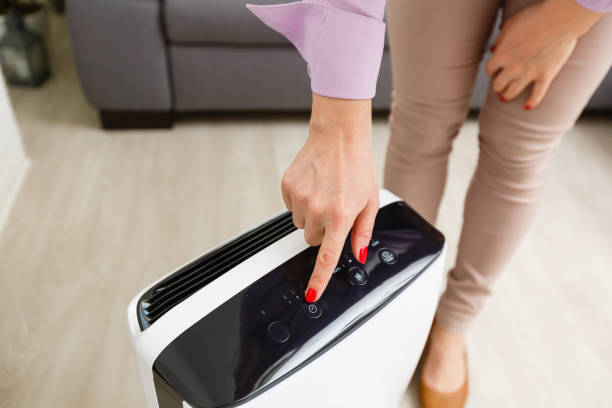Technology isn’t always all that bad. We have come a long way, and the days of overcooked food and damaged clothes because of excessive drying are behind us. All of this was possible thanks to the introduction of moisture sensors in home appliances. These small but amazing parts have changed how our everyday home appliances work. It made them work better and helped us save both time and money. You can rely on these moisture sensors to save your fabrics from any damage in dryers to make sure that your food is perfectly cooked in microwaves. We are sure that you didn’t know moisture detectors were helping us out this much daily!
What are Moisture Sensors?
In simple words, these sensors are useful devices which detect and determine the quantity of moisture present in various materials. This idea, though it does sound a little complicated, really is quite straightforward and easy to understand. Such moisture sensors have the property to decide the content of water, based on their electrical conductivity for whatever they may be measuring.
Modern home appliances usually use two main types of moisture-sensing technologies. The first one mainly uses electrical conductivity where water conducts electricity much better than dry materials. Because of this, the sensor easily measures how smoothly electrical current is passing through the item that is being monitored. The second one uses capacitive sensing, which measures the electrical charge-holding capacity of materials. It changes based on their moisture level.
Related: What Are Wiring Diagrams and Why Do They Matter for Your Appliances?
How Moisture Sensors Work in Different Appliances?
Dryers
Moisture sensors in your dryer are usually present where the clothes tumble. As the wet clothes come near the metal strips, the sensors start to measure the moisture level. So, when the clothes reach the chosen dryness level, the moisture detectors signal the dryer to stop. This helps keep your clothes from over-drying and getting fabric damaged.
Did you know that modern dryers don’t just run for a set time? They actually adapt themselves to how they are usually run based on the sensor readings. When they are drying a small load of lightweight clothes, the cycle can end much faster than when you are drying heavy towels.
Dishwashers
The moisture sensors in dishwashers work a little differently but have the exact same important task. They check the humidity level in the washing chamber and the cleanliness of the water that is sprayed. This helps them to determine when the dishes are truly clean and when to move to the next step of the cycle. This makes sure that everything is clean and saves water and energy.
Microwave Ovens
Advanced microwaves also use moisture sensors to detect the steam that is released during cooking. They make sure that the food is not too dry or overcooked. If you cook vegetables, the sensors will monitor the steam level, and automatically adjust the cooking time and the power level. So that you get a perfectly cooked meal.
Related: Essential Tools Every Appliance Owner Should Keep for Basic Repairs
Benefits of Moisture Sensor Technology
Energy Efficiency
By helping to lessen the unnecessary operation time, the moisture sensors help in reducing energy consumption. So, for example, your dryer would run and stop exactly when your clothes are dry rather than running for a fixed time. This will potentially save up to 15% on energy costs!
Extended Appliance Lifespan
When appliances work only as long as necessary, there is less wear and tear on their mechanical parts. Moisture sensors help your home appliances with that. This smarter way helps keep your appliances around for a longer time and needs fewer repairs!
Better Results
Doesn’t matter if it’s perfectly dried clothes, properly cooked food, or thoroughly cleaned dishes, moisture detectors help in getting the best results throughout. They reduce the risk of human error and push out guesswork from the picture.
Protection for Delicate Items
For your delicate clothes and materials, moisture sensors provide an extra layer of protection. They prevent over-drying which helps in maintaining the quality and long life of your clothes.
Maintenance and Care
To make sure the moisture sensors continue to work properly. Regular cleaning and maintenance is very important. In dryers, the moisture detector strips should be cleaned with a soft cloth and mild detergent to remove any kind of buildup. In the same way, dishwasher sensors should be kept free from mineral deposits and food particles.
Common signs of broken moisture sensors include:
- Clothes come out either too wet or overly dry.
- Unusually long drying times.
- Inconsistent cooking results in sensor-equipped microwaves.
- Dishwasher cycles that seem to run longer than needed.
Making The Most of Moisture Sensor Technology
To maximize the benefits of appliances that have a sensor, you should know how to use them properly. A lot of appliances have different sensor-driven settings for different materials and situations. You should take some time out to understand and learn these other options for better results.
For example, for dryers, sorting the clothes by fabric type and weight will help the sensors work better. Loading the appliance properly also matters! Overloading will prevent the sensors from accurately detecting moisture levels. Meanwhile, underloading is also problematic because it might lead to early cycle completion.
Related: How to Troubleshoot Your Washing Machine Issue Using the Diagnostic Mode
Conclusion
Moisture sensors have become a much-needed part of modern appliances. They have turned simple appliances into smart, efficient devices that can easily adapt to your needs. They mostly work quietly from behind the scenes, but their impact on your life is quite huge as they save energy and give you the best results. If and when you are shopping for new appliances, you should consider models that have moisture sensors. They can be a wise investment. Along with these benefits, don’t forget to take care of them. If you come across any kind of problems, call Barton Appliance Repair!





